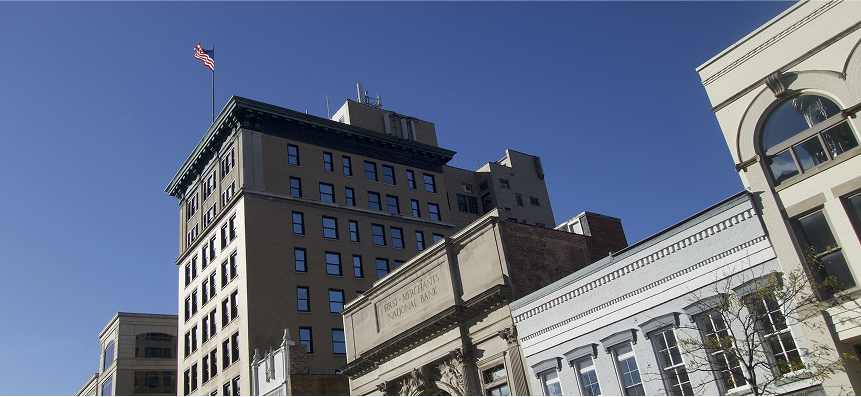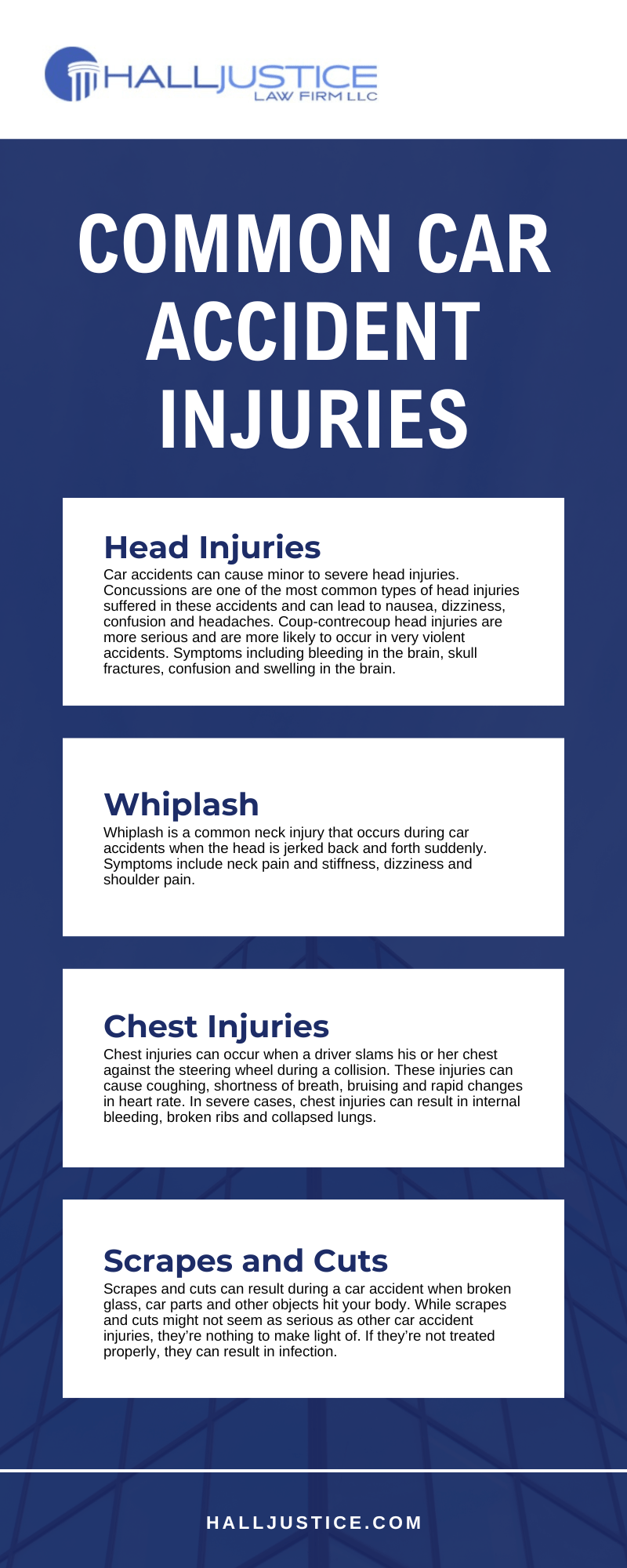Menu

Lafayette Car Accident Lawyer

Car Accident Lawyer Lafayette, IN
How Our Car Accident Lawyer Can Help You
Investigate the Accident
When you work with a car accident lawyer in Lafayette, IN, their first task is often investigating the accident. This investigation seeks to determine who or what caused the accident and gather evidence for a personal injury lawsuit, if necessary. These professionals review the accident scene, analyze police reports and gather eyewitness statements. They also legally procure video footage of the accident from surrounding businesses and traffic cameras. Finally, these individuals will review and organize your medical bills and reports.
As the investigation proceeds, a reputable attorney, such as those found at the Hall-Justice Law Firm, will prepare and develop arguments for your case.
Calculate Your Future Financial Need
You may not know what kind of financial assistance you need now and in the future. However, a reputable car accident lawyer in Lafayette, IN can help you calculate your medical costs, lost wages, property damage costs and any future care costs you will have.
Your attorneys will then compare these calculations with any settlement the insurance company offers you. If the settlement is not enough, a great law firm, e.g., Hall-Justice Law Firm, will pursue negotiations or a lawsuit in court.
Do’s and Don’ts After a Car Accident
If you sustained injuries in a car accident, you may not know what to do afterward. There are several things you should – and shouldn’t – do.
You Should:
Render Assistance
Even though you’re injured, try to give first aid to other accident victims. You may save a life, and you’ll also have detailed information to pass along to emergency services.
Call 911
Emergency personnel’s response time can be the difference between life and death. When you reach the 911 dispatcher, share important information first, such as how many people are hurt, if anyone appears to have life-threatening injuries, and the nature of those injuries. With that knowledge, enough medical personnel can be sent to the scene.
Gather Evidence
Crucial evidence can disappear after a car crash. Witnesses might leave the scene, rain may wash away spilled liquids in the roadway, and video recordings from surveillance equipment might be lost. Although police and other investigators will make a record of their findings, the pictures, videos and statements you record might contain things that their investigations miss.
Accept Medical Attention
This isn’t the time to be stoic. You were involved in an accident, and you need a medical evaluation immediately. Adrenaline may hide your pain, and some injuries get worse as time progresses. You may feel fine while you’re bleeding internally. Medical personnel can find hidden injuries that could be life-threatening.
There’s also another reason to get a medical assessment. It will be used as a baseline for your medical condition in your personal injury case, showing your injuries and their severity.
Call a Car Accident Lawyer in Lafayette, IN
Although you can wait to consult an attorney, there’s no reason to. Hiring a car accident lawyer quickly means that they can get started on your case faster. Insurance companies won’t want to pay sufficient compensation, but your attorney will fight for your rights from day one.
You Shouldn’t:
Share Details of Your Accident on Social Media
“Anything you say can and will be used against you…” That includes posts you make on your social media accounts. Your actions will be scrutinized during your claim process, and insurance companies can use anything you post as evidence.
State That You Are Responsible for the Accident
The compensation you may receive is affected by your degree of liability in causing the accident. Let appropriate parties assign guilt; don’t admit to anything.
Refuse Continued Medical Treatment
Your health is important, and discontinuing medical treatments for any reason will likely hinder your recovery. In addition, insurance companies can imply that you weren’t severely injured if you refuse treatment.
Communicate and Negotiate With the Insurance Company
As for-profit entities, insurance companies have one primary goal, to make money. Therefore, they will do all they can to reduce your settlement amount. Sometimes, they will deny your claim entirely. Their hope is that you think your claim is only worth the amount they offer you and that you won’t pursue a lawsuit. If you sign any paperwork, you could actually waive your right to sue.
However, a great car accident lawyer in Lafayette, IN will not only communicate with the insurance company to ensure that your claim is accepted, but this professional will also negotiate a settlement that will meet your current and future financial needs. If the negotiation doesn’t go anywhere, your attorney will pursue a lawsuit and sue for damages, including legal fees.
Protect Your Finances From Debt Collectors
If you are recovering from a car accident, the last thing you want to think about is how you will pay your bills. Your focus should be on recovering, not on financial matters. If you fall behind on your bills, including your medical bills, your debtholders can sell your debt to collections agencies. When this occurs, these agencies tend to harass you with daily phone calls, letters and other scare tactics. They may even threaten you.
This is where your lawyer comes in. A great lawyer will stop this harassment and defend you against these collection agencies. They work with these agencies so you can focus on healing.
Things To Do After A Car Accident
If you’ve been involved in a car accident, a West Lafayette, IN car accident lawyer can help you with your next steps.
Car accidents are unfortunately all too common and can cause serious injuries or even fatalities. Finding trustworthy legal assistance is the best way to get the compensation you deserve. In this section, we’ll walk you through what you should do after a car accident, and explain why you should lawyer up.
Read on to get started, and reach out to the team at Hall-Justice Law Firm LLC to see how we can help.
1. Stay Calm And Check For Injuries
After a car accident, it’s important to remain calm and assess the situation. Check yourself and your passengers for any injuries. If anyone is injured, call for immediate medical assistance. Your health and well-being should be the top priority.
After you’ve checked for injuries, try to get somewhere safe if possible. Get out of the flow of traffic, get to the side of the road, and (if possible) get to a quieter area like a nearby parking lot or side street.
2. Gather Information
Exchange information with the other driver involved in the accident – or the other drivers, if there was multiple cars involved. Get their names, contact details, driver’s license number, and insurance information. Similarly, provide your information to the other parties involved. Gathering accurate information is crucial for insurance claims and potential legal action.
While you’re collecting info, take pictures of the scene of the accident. Make sure you get some good shots of the involved vehicles, the extent of the damage, and any visible injuries. It’s also helpful to take pictures of the surrounding area. These photographs can serve as valuable evidence when dealing with insurance companies or pursuing legal action.
3. Contact First Responders
Notify the police about the accident, especially if there are injuries, significant property damage, or a dispute between the parties involved. The police report can provide an objective account of the accident, which can be important for insurance claims and legal proceedings.
Even if you believe your injuries are minor, it’s essential to seek medical attention promptly. Some injuries may not manifest symptoms immediately, and a medical evaluation can identify any hidden or underlying injuries. Additionally, medical documentation will be crucial for your insurance claim or potential lawsuit.
4. Consult A Car Accident Lawyer
After a car accident, it’s in your best interest to get in touch with a West Lafayette car accident lawyer. They specialize in handling car accident cases and can guide you through the legal process, ensuring your rights are protected. A car accident lawyer will investigate the accident, gather evidence, negotiate with insurance companies on your behalf, and pursue legal action if necessary.
5. Make Sure You Have A Legal Team You Can Trust
Not all lawyers are created equal. It’s important to choose a legal team that has a track record of success and a commitment to their clients. If you’ve been in an accident, you need a lawyer that’s as committed to your case as you are. Get in touch with the professionals at Hall-Justice Law Firm LLC, and see how a West Lafayette car accident lawyer from our office can help.
Hiring a Car Accident Lawyer
If you were hurt in a car accident, your next step is to consult a car accident lawyer in Lafayette, IN. He or she can help you gather evidence, identify witnesses and negotiate with the defendant’s insurance company. During your initial meeting with a lawyer, you should ask the following questions:
- How familiar are you with Indiana car accident law in this area?
- Will you be doing the work on my case?
- Have you given presentations on car accident law to other Indiana attorneys many times?
- How long have you been in the area and are you familiar with the community that the jurors are part of?
- Have you taken leadership roles in the personal injury legal community and the local legal community?
- Where did you go to school?
- What are the strengths and weaknesses in my car accident case?
- What is your fee structure?
- Is there anything I can do to help my case?
Common Car Accident Injuries
Car accidents can result in a wide range of injuries, ranging from mild to severe. Here are the most common injuries people suffer in vehicle collisions:
- Head Injuries: Car accidents can cause minor to severe head injuries. Concussions are one of the most common types of head injuries suffered in these accidents and can lead to nausea, dizziness, confusion and headaches. Coup-contrecoup head injuries are more serious and are more likely to occur in very violent accidents. Symptoms including bleeding in the brain, skull fractures, confusion and swelling in the brain.
- Whiplash: Whiplash is a common neck injury that occurs during car accidents when the head is jerked back and forth suddenly. Symptoms include neck pain and stiffness, dizziness and shoulder pain.
- Chest Injuries: Chest injuries can occur when a driver slams his or her chest against the steering wheel during a collision. These injuries can cause coughing, shortness of breath, bruising and rapid changes in heart rate. In severe cases, chest injuries can result in internal bleeding, broken ribs and collapsed lungs.
- Scrapes and Cuts: Scrapes and cuts can result during a car accident when broken glass, car parts and other objects hit your body. While scrapes and cuts might not seem as serious as other car accident injuries, they’re nothing to make light of. If they’re not treated properly, they can result in infection.
4 Ways Road Rage Can Lead to Car Accidents
Sharing the road with other vehicles can leave you at the mercy of someone who is angry. This kind of driving, commonly known as road rage, can cause serious accidents for drivers. Knowing how this phenomenon influences crashes can help you determine what to do next if a crash occurs.
1. Driving Over the Speed Limit
Continually breaking the speed limit in order to catch up to another vehicle is not only illegal but can also put everyone around a driver in peril. Drivers with anger issues may tailgate a car that irritated them and try to catch up with them, even if there are multiple lanes of traffic surrounding them. This kind of reckless driving can leave others at risk for a crash, since the person with road rage may not be able to stop in time if the car in front of him or her came to a stop. If you are in a car accident, talking to a car accident lawyer in Lafayette, IN, like the Hall-Justice Law Firm, may be your next step.
2. Distracting Others
Continual honks and flashing high beams can cause people on the road to turn around and stare. This can be dangerous when these distractions cause an accident. An angry driver who is trying to intimidate a car on the road can use these tactics to enrage or distract you. Contacting a car accident lawyer in Lafayette, IN, after a crash may be one idea for how to handle this.
3. Erratic Turning or Braking
One way some angry drivers try to irritate others is by stopping short while they are driving in front of you on a highway or other road. You may not be able to stop in time, which could lead to an accident. Brake checking and swerving wildly around between lanes can leave you fearful of what this driver could do next.
A person weaving in and out of a lane may not allow anyone to pass him or her, which can cause another vehicle to accidentally ram into the side or the back of your car. Describe the scene to a car accident lawyer in Lafayette, IN, if you visit one, like the Hall-Justice Law Firm.
4. Physical Confrontations
In some extreme circumstances, a person with road rage may exit his or her car and approach yours. You could notice this driver holding a weapon or attempting to harm you in another way. These physical confrontations can leave you injured, which may lead to you seeking a car accident lawyer in Lafayette, IN.
Schedule a consultation with Hall-Justice Law Firm car accident lawyer in Lafayette, IN today to discuss your case.
Lafayette Car Accident Infographic

Lafayette Car Accident FAQs
Car accidents are a stressful and often confusing experience. Victims and witnesses alike usually have several pressing questions in the aftermath. If you have been injured in a crash, you likely have many questions about what legal recourse you may have for your losses. The following are some common questions clients ask each Lafayette, IN car accident lawyer at our firm. For more detailed information about your situation, contact Hall-Justice Law Firm LLC directly.
What Should I Do Immediately After A Car Accident?
One of the most common questions is what steps to take right after a collision. The immediate aftermath of an accident can be chaotic, but following a clear protocol can protect your safety, legal rights, and insurance claims:
- Check for injuries: Ensure everyone involved is safe and call emergency services if medical attention is needed.
- Move to safety: If possible, move vehicles to the side of the road to prevent further accidents.
- Call the police: Even for minor accidents, it’s wise to file a police report. This provides an official record, which may be crucial for insurance or legal claims.
- Document the scene: Take photos of the vehicles, damage, and surroundings; exchange contact and insurance information with the other party.
- Avoid admitting fault: Focus on facts when talking to others or the police, but don’t apologize or admit fault, as this could be used against you later.
Do I Need To See A Doctor Even If I Feel Fine?
Yes, you should see a doctor after a car accident, even if you feel fine initially. Many injuries, such as whiplash, concussions, or internal damage, may not present symptoms immediately. Seeing a medical professional ensures you get proper care and establishes a record of your injuries, which is essential for insurance claims or legal actions.
Delaying medical treatment can not only complicate your recovery but it can also weaken your case if you later decide to seek compensation. Insurance companies may argue that your injuries weren’t serious or were unrelated to the accident if you don’t seek immediate treatment.
How Do I Determine Who Was At Fault?
Determining fault is critical for resolving claims but is not always straightforward. Fault can depend on traffic laws, witness statements, and evidence from the scene. Here’s how fault is typically assessed:
- Police report: Officers investigating the scene may indicate who they believe was at fault in their report.
- Eyewitness accounts: Statements from unbiased witnesses can provide clarity on what happened.
- Traffic laws: Violations like running a red light or failing to yield often point to a fault.
- Accident reconstruction experts: Experts can analyze the evidence to determine fault for complex cases.
Should I Contact My Insurance Company?
You should contact your insurance company immediately after an accident, even if you weren’t at fault. Most policies require prompt notification to ensure coverage. When speaking to your insurer, provide accurate information but avoid speculation. Stick to the facts, and don’t admit fault.
If the other driver is at fault, their insurance may be responsible for covering damages. However, your insurer can still play a role by covering initial costs or pursuing subrogation (recovering expenses from the other party’s insurer).
Consider consulting an attorney before providing recorded statements to any insurance adjuster, as they may use your words to minimize payouts.
Do I Need A Lawyer For My Car Accident?
While not every car accident requires legal representation, you may need a car accident lawyer if the accident involves significant damages, injuries, or disputes over fault. An attorney can help:
- Negotiate with insurance companies: Insurers often try to minimize payouts, and a lawyer can advocate for fair compensation.
- Calculate damages: They’ll consider medical bills, lost wages, property damage, and non-economic damages like pain and suffering.
- Represent you in court: If a fair settlement can’t be reached, your lawyer can file a lawsuit and represent you in legal proceedings.
- Handle complex cases: Multi-car accidents or those involving commercial vehicles often require legal expertise to navigate.
Consulting a lawyer soon after the accident can help you understand your rights and options, especially if liability is disputed or the insurer is uncooperative.
Are there benefits to speaking with police after an accident?
Though you’ll often hear lawyers tell you to avoid relaying a lot of information to people following an accident (to avoid saying the wrong thing or harming your claim), it can be very beneficial to have the police at the scene of your car accident. In fact, our Lafayette car accident lawyer knows that there are often very strict rules when it comes to involving the police following an accident. There are certain times that you are legally required to contact the police following a car accident, including:
- If a passenger or driver was injured
- If a passenger or driver died
- If there is a certain amount of property damage
- If you are involved in an accident and you are required to notify your insurance
These are some of the instances where you will need to involve the police. You may find yourself in a situation where the other driver is pressuring you not to call the police following the accident because they are concerned about insurance rates going up or they don’t want this on their driving record. However, it is important to not only follow your gut but follow the law. Having police officers at the scene can bring order to chaos, it can allow you to have evidence to point back to later (a police report), and especially if they give the other driver a ticket, this can bolster your claim.
How does it substantiate a car accident claim?
There are many times that a driver will either say they were not involved in the accident or that they were involved but they did not cause it. An unbiased police report can help to show that a trained law enforcement agent was at the scene, evaluated the evidence, and provided their professional opinion.
Let Our Personal Injury Law Firm Help
Although having a Lafayette car accident lawyer is not required by law to pursue an injury claim, having a lawyer advocating for you against the insurance company gives you a better chance of obtaining the full compensation you deserve. Contact Hall-Justice Law Firm LLC today to schedule a free and no-obligation case evaluation.


EXCELLENTTrustindex verifies that the original source of the review is Google. Justice was very informative & kind & went above & beyond for me in every way she could . I highly recommend this attorney!!!!Posted onTrustindex verifies that the original source of the review is Google. Had an initial consult with the paralegal this morning. She was so polite, and very helpful. Listened, took my info and made the process very easy, in an area where I have a tough time finding attorney's. Thank YouPosted onTrustindex verifies that the original source of the review is Google. Mrs Hall did a great job in helping me get the best outcome for my case. I highly recommend her services.Posted onTrustindex verifies that the original source of the review is Google. I was fortunate to receive help from Susannah and her team. Susannah is a highly knowledgeable expert in her field. Although my requests was relatively straightforward for such an experienced professional, Susannah and her team provided me with outstanding support and answered all of my questions. I recommend discussing your specific situation with Susannah—even if it feels stressful—because she is excellent at analyzing circumstances and presenting clear options and potential actions. I have no doubt that Susannah and her team have the expertise to provide the best insight and guidance in their field.Posted onTrustindex verifies that the original source of the review is Google. Process went smoothlyPosted onTrustindex verifies that the original source of the review is Google. Susannah Hall-Justice is an amazing attorney! She was on top of things every step of the way and I am very thankful for her!Posted onTrustindex verifies that the original source of the review is Google. I am currently a client of hers. I do get nervous going to court or just simply meeting with her as my lawyer because I never had to be in a situation that required me to need a lawyer! I feel safe with Ms. Hall-Justice because you can just tell she has your best interest! She listens, observes and make sure you are heard! I am praying to God I don’t have to look like what I’m going through because it’s stressful and I just want to go back to my regular life with my children!Posted onTrustindex verifies that the original source of the review is Google. This attorney is definitely a credit to her craft! She is very personable and never talks down to a client. She makes a person feel like he/she is actually part of what's going on. She negotiated with the prosecutor and i was offered EVERYTHING that I had hoped for and even more! I would definitely hire her again and i highly recommend that you hire her and trust her in what is often a very vulnerable and confusing time.Posted onTrustindex verifies that the original source of the review is Google. When we needed a Lafayette attorney to represent us for various charges, Susannah was all we could have hoped for. She had several charges dropped immediately and the remaining minor charges diverted for good behavior. After two months of good behavior, all charges were dismissed. Susannah and her assistant Erica were responsive, supportive and above all very effective. All at very reasonable rates. I have worked as a criminal defense lawyer in the past and I was very impressed.Posted onTrustindex verifies that the original source of the review is Google. Impressive and refreshing. I called Susannah’s office first thing in the morning to inquire about a minor legal service and left my contact information with her assistant. Susannah personally called me back only a short while later despite how busy she undoubtedly is. It turned out that the legal opinion I required had to be from a practicing attorney in a different state so we didn’t go forward. Still, the fact that she personally returned my call, and was genuinely pleasant and attentive, substantiates her very positive and personal reviews. Not to stray into the negative but what a breath of fresh air compared to most of the attorneys with whom I’ve spoken in this area - routinely terse, rude and bumptious. This (Hall-Justice) is the law office I will call first for any future legal needs. Thank you.


